Burlington's Role in Wisconsin's Dairy Industry
THE DAIRY INDUSTRY IN BURLINGTON AND VICINITY
The dairy industry in Burlington and vicinity dates back to the late 1830s when many of the farmers, who came to settle here, brought cows. Some settlers produced just enough milk and butter for their families, but others produced surplus milk and butter that they could sell to neighbors and villagers.
In 1846 Ephraim Perkins of Burlington started producing cheese from his own cows and from those of some of his neighbors, and shipping it as far away as Chicago. Wisconsin state fair records reveal that a Burlington man – Samuel Thurston – received one of the first awards for cheese-making by taking a prize for the best cheese at the fair in 1851.
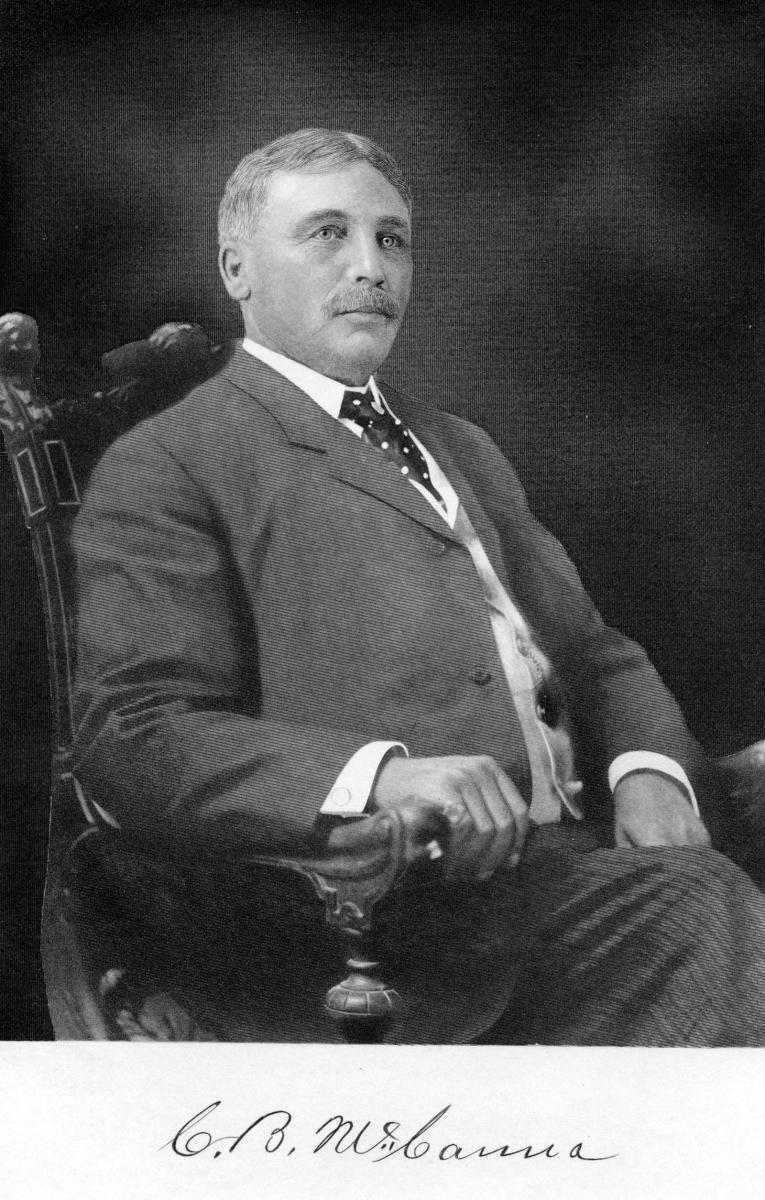 Charles B. McCanna (right), who, with Truman P. Davis, had started a cheese factory at Rochester in 1877 and another at Springfield in 1878, started a cheese and butter factory in Burlington in 1882. It was on Chestnut Street near where the White and Fox rivers meet. By 1892 the McCanna Cheese & Butter Manufacturing Co. had factories at eight different locations in this area and a ninth at Windsor in Dane County. In 1893 McCanna joined businesses with cheese merchant, Robert G. Fraser, and the company name was changed to McCanna & Fraser Co., with a branch office in Chicago.
Charles B. McCanna (right), who, with Truman P. Davis, had started a cheese factory at Rochester in 1877 and another at Springfield in 1878, started a cheese and butter factory in Burlington in 1882. It was on Chestnut Street near where the White and Fox rivers meet. By 1892 the McCanna Cheese & Butter Manufacturing Co. had factories at eight different locations in this area and a ninth at Windsor in Dane County. In 1893 McCanna joined businesses with cheese merchant, Robert G. Fraser, and the company name was changed to McCanna & Fraser Co., with a branch office in Chicago.
In 1898 McCanna's Burlington factory started manufacturing condensed milk. The company ordered 15 refrigerated railcars, and changed its name to Wisconsin Condensed Milk Co. The milk was sold primarily as “Lion Brand” although the company also canned milk for other companies and private brands. Markets were developed in New York City, Brooklyn, Philadelphia, and New Orleans. In 1908 McCanna began manufacturing evaporated milk and gradually the domestic trade came to demand more of this and less of the condensed milk, which went mostly to foreign markets. (The major portion of the company's Burlington facilities is shown in the 1913 photo below.)
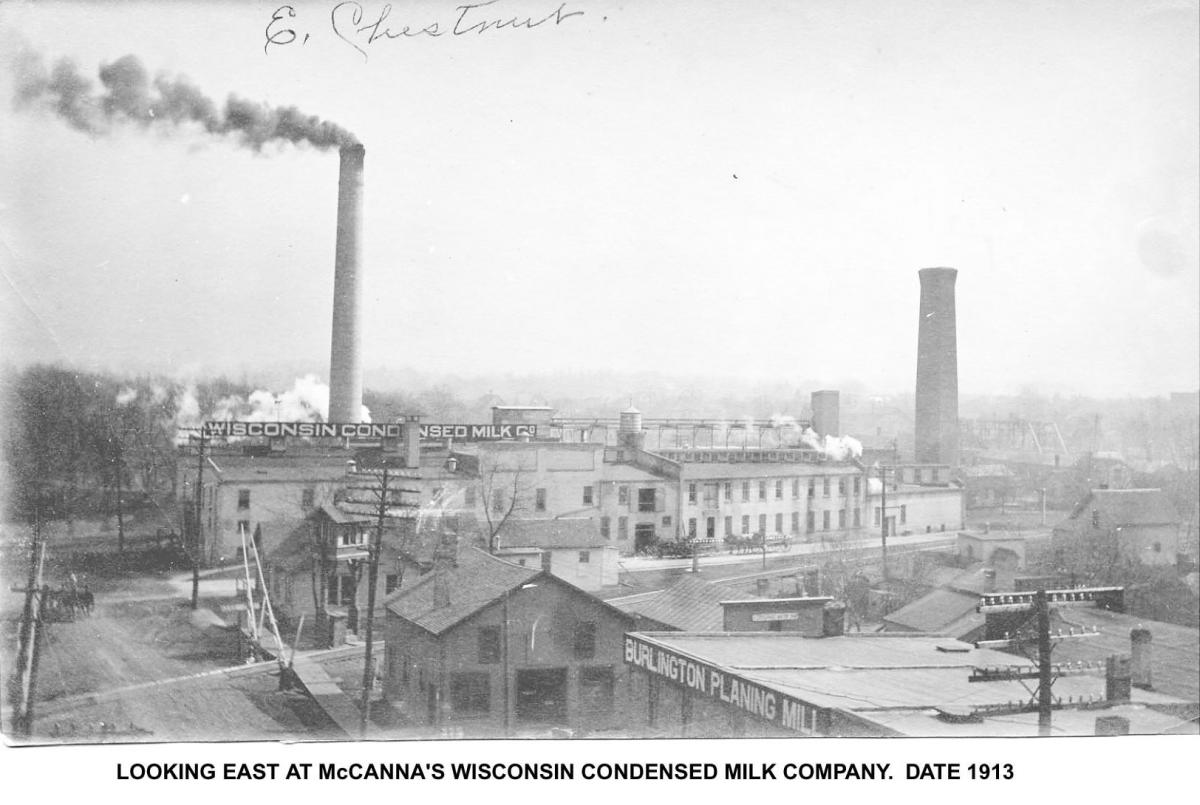 In Burlington, the company added a tin can factory in 1902, a cold storage plant in 1902, and a 2-story warehouse in 1906. It also bought a milk plant, complete with a tin can factory, in Waverly, Iowa, in 1899, and later opened milk plants at Pecatonica, Illinois (1903), Grayslake, Illinois (1912), and Valders, Wisconsin (1917). After C. B. McCanna’s death in 1913, his son, C. Roy McCanna, headed the company until it was sold to Nestle’s Food Company, which took over in 1920. The business was renamed Nestle’s Milk Products, Inc., and Burlington became Nestle’s midwest division headquarters. In 1922, the plant added powdered milk to its line; and during World War II, it supplied the armed forces with canned and powdered milk. After the war and as the southern states developed a dairying industry, demand dropped. Nestle’s closed its Burlington milk plant in 1950 and sold the tin can shop in 1959. (The major portion of Nestle's Burlington operation is shown in the 1949 photo below.)
In Burlington, the company added a tin can factory in 1902, a cold storage plant in 1902, and a 2-story warehouse in 1906. It also bought a milk plant, complete with a tin can factory, in Waverly, Iowa, in 1899, and later opened milk plants at Pecatonica, Illinois (1903), Grayslake, Illinois (1912), and Valders, Wisconsin (1917). After C. B. McCanna’s death in 1913, his son, C. Roy McCanna, headed the company until it was sold to Nestle’s Food Company, which took over in 1920. The business was renamed Nestle’s Milk Products, Inc., and Burlington became Nestle’s midwest division headquarters. In 1922, the plant added powdered milk to its line; and during World War II, it supplied the armed forces with canned and powdered milk. After the war and as the southern states developed a dairying industry, demand dropped. Nestle’s closed its Burlington milk plant in 1950 and sold the tin can shop in 1959. (The major portion of Nestle's Burlington operation is shown in the 1949 photo below.)
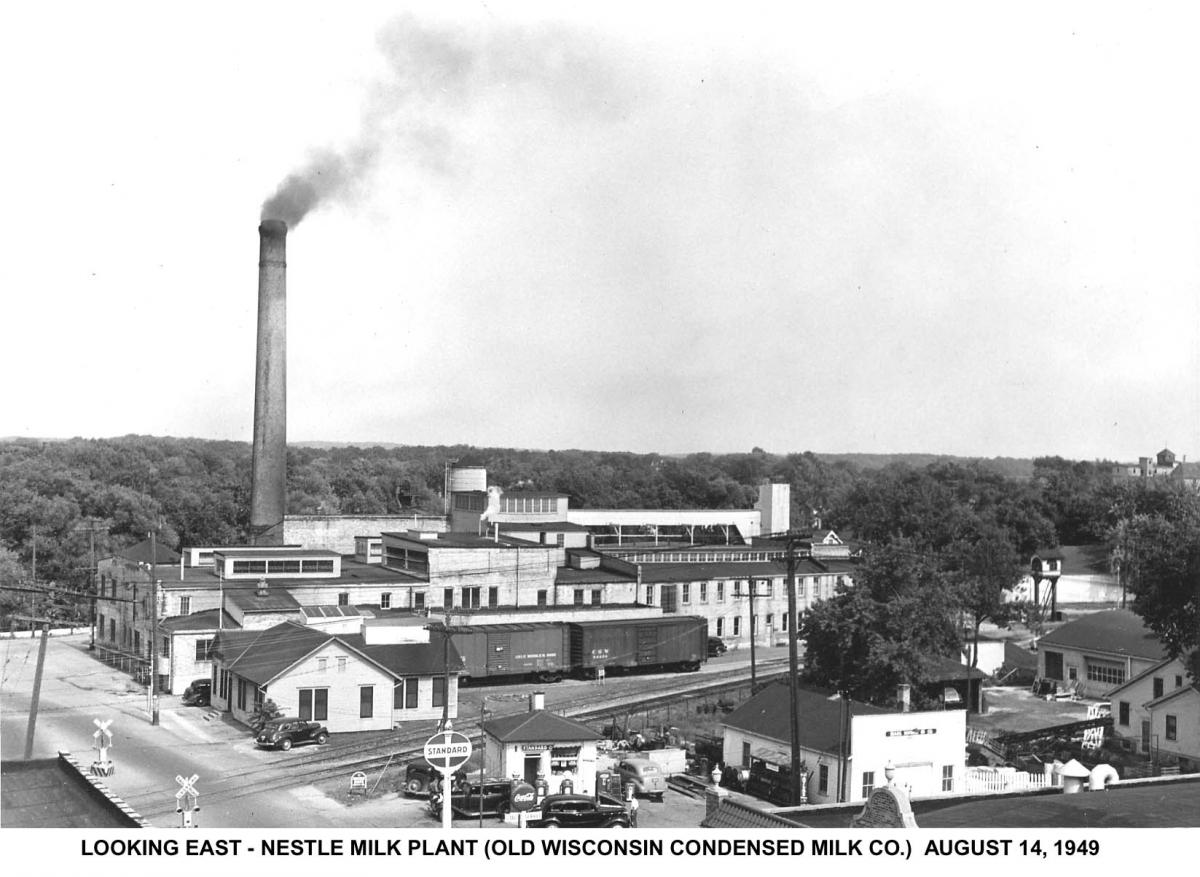
In 1921 the Milk Producers’ Co-operative Marketing Co. started operations in a new building put up by the Badger Dairy Co. on Dodge Street. The plant, later operated by Mid-West Dairy Co., closed in 1925; and Murphy Products Co. bought the building.
In 1922 Sanitary Milk Co. opened in the old Farmers’ Creamery Co. building on E. Water Street. After several changes in ownership, it closed in 1926. That same year, the plant was bought by new owners and reopened, again as the Sanitary Milk Co. In 1929 Andrew Adam bought an interest in the company, and in 1935 built and moved to a new plant on Wilmot Avenue (now S. Pine Street). The company closed in 1968.
In 1923 Joseph Bazal opened a creamery on Washington Street in the former Free Press building (now a laundromat). Bazal moved his creamery in 1927 to the former city and town hall building, now occupied by Trend Setters. In 1949 Bazal sold shares in the business to Eugene and Elmer Weber, who moved the business to the corner of State and Pine streets in 1951 and to a building on Milwaukee Avenue in 1960.
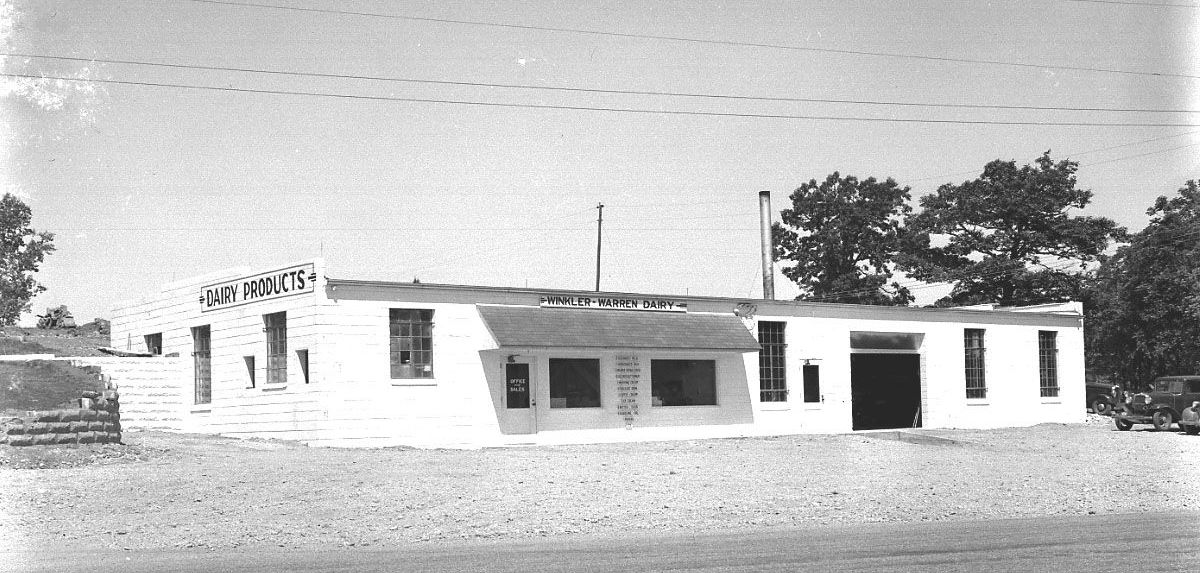 In 1931 Arthur Winkler and James Warren combined their milk routes and in 1932 built a new milk plant on the Winkler farm near Bohner’s Lake. In 1946 they built a new dairy (shown at right) on county trunk P at Fish Hatchery Road. David Warren bought the Winkler interest in 1950 and changed the name to Warren Dairy.
In 1931 Arthur Winkler and James Warren combined their milk routes and in 1932 built a new milk plant on the Winkler farm near Bohner’s Lake. In 1946 they built a new dairy (shown at right) on county trunk P at Fish Hatchery Road. David Warren bought the Winkler interest in 1950 and changed the name to Warren Dairy.
The Burlington Co-operative Pure Milk Association, organized in 1932, opened a milk receiving station in the former Ferd Robers building on Dodge Street in September of that year. The plant was rebuilt after being bombed a couple of weeks later. The plant was enlarged in 1944, with the association later renamed Associated Milk Producers, Inc.
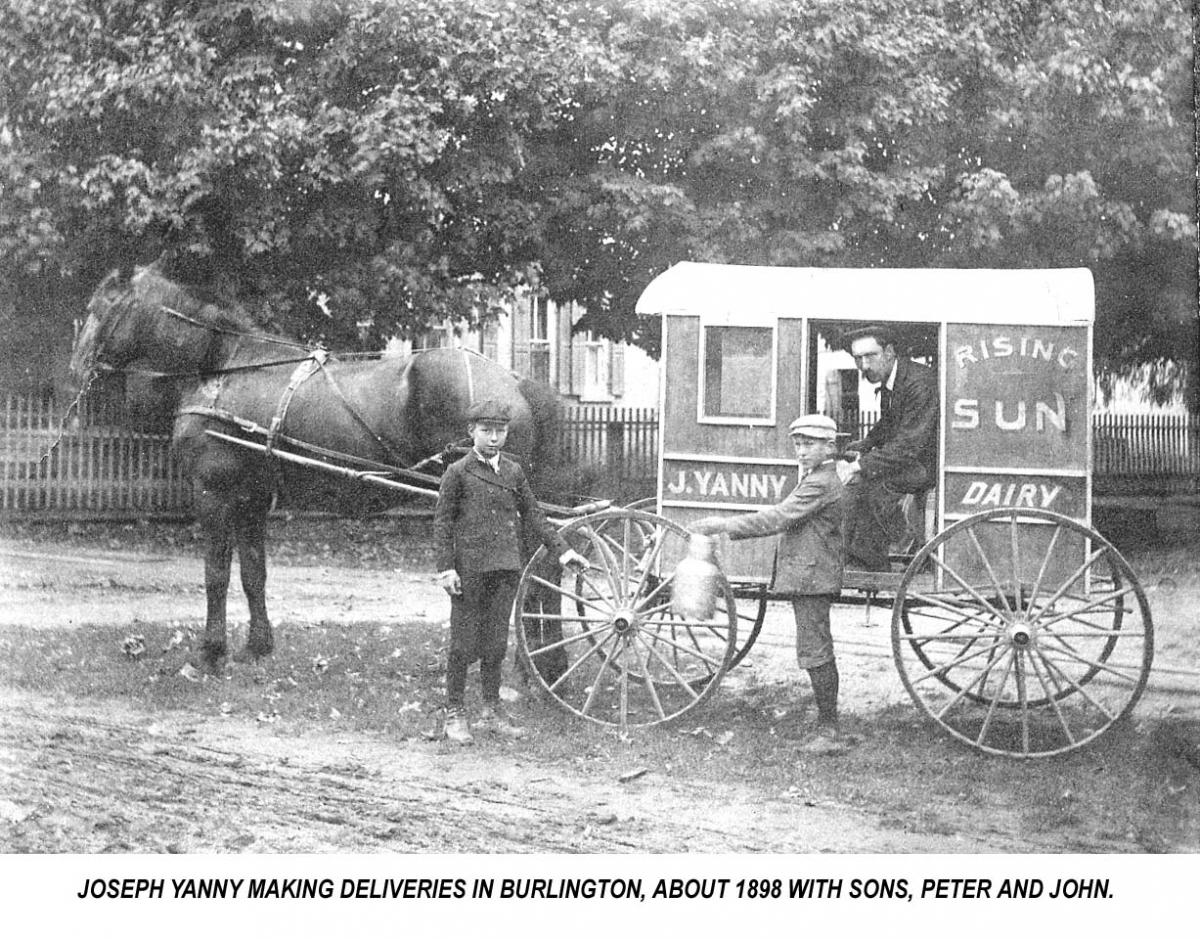 Over the years, other farmers and businesses also delivered milk and milk products to residents and stores in Burlington. They included William D. Rooker, Lute Perkins, Francis Bankes - Spruce Farm Milk and Cream, Jacob Steinhoff, Pat Cunningham, Ellis Bartholf, Joseph Yanny - Rising Sun Dairy, Joseph Yanny and Sons (see photo at left) - Burlington Pure Milk Co., John F. Wegge - Valley Farm Dairy, J. W. Summers - Willow Spring Dairy, Martin Vandenboom - Clover Dale Dairy, George Rossmiller, George W. Fiske, William B. Summers, John Trimberger, John Kornhoff, Fred W. Boulden - Boulden Pure Milk Co., Brown Swiss Dairy, George H. Bieneman, Fred Steinhoff & Sons - Red Star Milk Co., Henry Busch, Mr. Dexter, Leonard Teut - East Side Dairy, James Langdon and Son - East Side Dairy, John Frey, Brierly Bros., John Yahnke & Sons, H. J. Rieck, Henry C. Clausen, Clausen Bros., Mr. Nagel, and Bieneman Bros. (George B. and Edward).
Over the years, other farmers and businesses also delivered milk and milk products to residents and stores in Burlington. They included William D. Rooker, Lute Perkins, Francis Bankes - Spruce Farm Milk and Cream, Jacob Steinhoff, Pat Cunningham, Ellis Bartholf, Joseph Yanny - Rising Sun Dairy, Joseph Yanny and Sons (see photo at left) - Burlington Pure Milk Co., John F. Wegge - Valley Farm Dairy, J. W. Summers - Willow Spring Dairy, Martin Vandenboom - Clover Dale Dairy, George Rossmiller, George W. Fiske, William B. Summers, John Trimberger, John Kornhoff, Fred W. Boulden - Boulden Pure Milk Co., Brown Swiss Dairy, George H. Bieneman, Fred Steinhoff & Sons - Red Star Milk Co., Henry Busch, Mr. Dexter, Leonard Teut - East Side Dairy, James Langdon and Son - East Side Dairy, John Frey, Brierly Bros., John Yahnke & Sons, H. J. Rieck, Henry C. Clausen, Clausen Bros., Mr. Nagel, and Bieneman Bros. (George B. and Edward).
